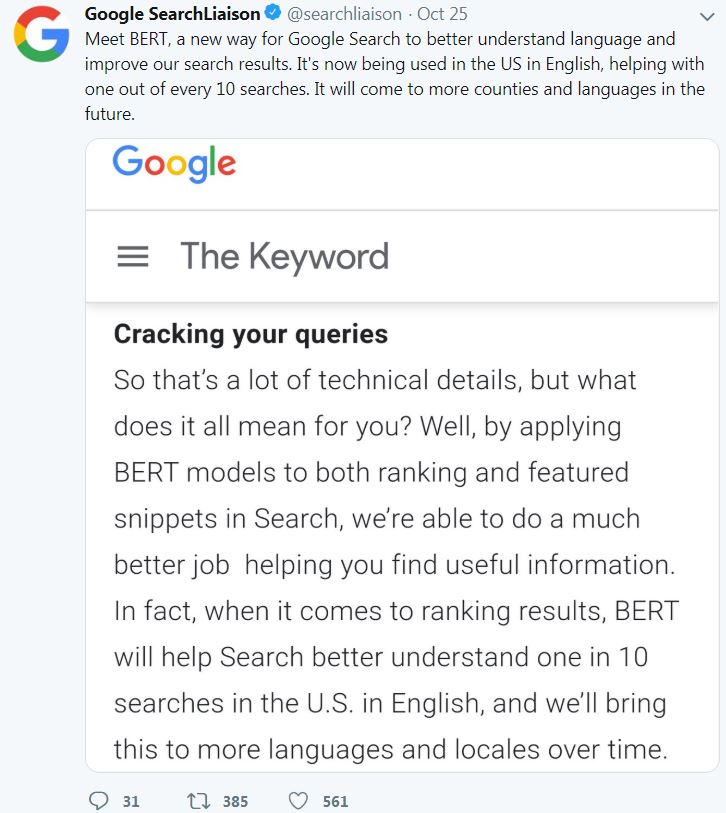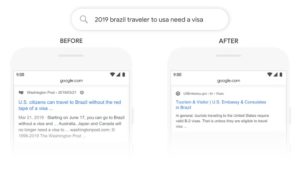Introducing BERT the New Algorithm Update From Google
by Anvil on October 29, 2019Digital MarketingOn October 25th 2019 the Google SearchLiason twitter account introduced us to BERT. BERT is an algorithm update to Google search aimed at improving its understanding of complicated search queries based on context and nuance. The update will allegedly affect 10% of search queries. Google is calling BERT the “biggest leap forward in the past five years, and one of the biggest leaps forward in the history of search.”

The team here at Anvil Media is committed to staying up-to-date on the latest news and changes from Google. We are also dedicated to keeping our clients, readers, and followers informed. In that spirit we are here to explain what the BERT update is, how BERT will affect search, and the future of search with BERT.
What is BERT?
Bidirectional Encoder Representations from Transformers or BERT is Google’s neural network-based technique for natural language processing pre-training. In laymen’s terms BERT is an algorithm update focused on learning and processing natural language. The update is aimed at improving the Google Algorithm’s understanding of the subtleties, nuances, and context that make up our languages and in turn our search queries. The update is focused on longer tail queries that are more conversational in nature. BERT is also taking steps to better understand prepositions like “for” and “to” that matter to the meaning of the query. In the past Google looked at each word in a query individually, hence the importance of keywords. With BERT Google aims to interpret the entire phrase in order to serve more accurate and useful search results.
How BERT will affect Search
In the past, Google Search felt a little like trying to have a conversation in a crowded restaurant or bar. Google was the friend across the table nodding and smiling, all the while planning what they would say based on the one or two words they heard. BERT aims to make Google a much better dinner date by allowing it to understand more. Google and BERT are focused on providing the best search result based on the intent of your search. In its announcement, Google provided examples of how BERT is working to understand the contextual clues in everyday searches. The image below is an example of a searcher in Brazil looking for visa rules and regulations for travel to the US, not the other way around. Every country has different laws and so the intent and details of this search are important. In the past the algorithm was not advanced enough to understand this context of the search and would return results based around individual keywords like USA, Travel, Visa, and Brazil.

As you can see the after-update result is more focused on travel TO the USA and is more relevant to the Brazilian searchers original query.
Another interesting aspect of BERT is its potential for e-commerce websites. Product pages tend to rank well for long-tail queries, and BERT is aimed at understanding those queries. BERT will be better able to understand search queries around product attributes. Examples of these searches include queries like: Nike Shoes with black rubber sole, pickup truck with four doors, or living room furniture made from eco-friendly material. Optimizing your product pages with product details and attributes will be more important than ever. Listing all available materials, colors, or options will be important. While images, especially interactive ones, are great for seeing the different color or material options, search engines will need that detail in the text as well.
It is important to note that the BERT update is aimed at improving how Google understands and processes search queries, not websites. It will however be even more important that content is well written, focused, and precise.
Future of search with BERT
Google is hoping that the BERT update allows users to search in a more conversational and natural manner and have results returned that are both relevant and useful. When I hear the word conversational in a Google blog or tweet my mind tends to think of voice search. BERT is likely a jumping off point to a whole host of updates and algorithms aimed at understanding all the eccentricities of human language and speech. Understanding everything from context to inflection will be part of making voice search a truly seamless and an integrated part of our daily lives. The BERT update is an important step for Google in that journey.
BERT is being touted as a quantum leap forward for search. Google knows that improving search is a constant endeavor. They will continue to work and learn how we search in an effort to provide us with the best possible results. Anvil is also dedicated to constant improvement and learning. Visit the Anvil website to see how we can help your business stay up-to-date with the latest in Search Engine Optimization, Pay-Per-Click Marketing, and Social Media Marketing.
